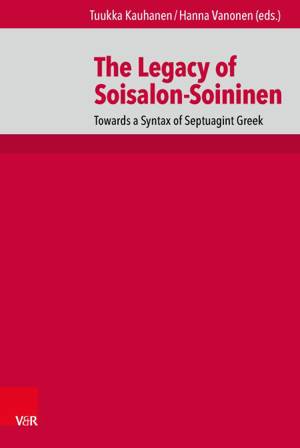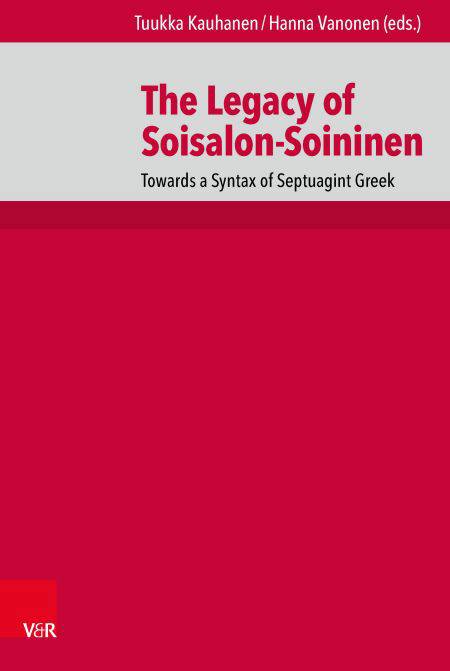
- Afhalen na 1 uur in een winkel met voorraad
- Gratis thuislevering in België vanaf € 30
- Ruim aanbod met 7 miljoen producten
- Afhalen na 1 uur in een winkel met voorraad
- Gratis thuislevering in België vanaf € 30
- Ruim aanbod met 7 miljoen producten
Zoeken
The Legacy of Soisalon-Soininen E-BOOK
Towards a Syntax of Septuagint Greek
€ 150,00
+ 150 punten
Omschrijving
Ilmari Soisalon-Soininen (1917–2002) was a Finnish Septuagint scholar and the father of the translation-technical method in studying the nature of translations. The present volume upholds his work with studies related to the syntax of the Septuagint. It is impossible to describe the syntax of the Septuagint without researching the translation technique employed by the translators of the different biblical books; the characteristics of both the Hebrew and Greek languages need to be taken into consideration.
The topics in this volume include translation-technical methodology; case studies concerning the use of the definite article, preverbs, segmentation, the middle voice, and the translations of Hebrew stems in the Pentateuch; selected syntactical features in Isaiah and Jeremiah; the connection between the study of syntax and textual criticism, especially in Judges; and lexical distinction between near-synonymous words.
The volume concludes with six articles by Soisalon-Soininen, originally written in German and translated into English. These studies pertain to the use of the genitive absolute, renderings of the Hebrew construct state and the personal pronoun, interchangeability of prepositions, segmentation, and Hebraisms. These articles have lasting value as analyses of significant translation-syntactic phenomena and, together with Soisalon-Soininen's monographs, they crystallize his translation-technical method.
The volume paves way to a description of the syntax of the Septuagint that does justice to its nature as a translation.
The topics in this volume include translation-technical methodology; case studies concerning the use of the definite article, preverbs, segmentation, the middle voice, and the translations of Hebrew stems in the Pentateuch; selected syntactical features in Isaiah and Jeremiah; the connection between the study of syntax and textual criticism, especially in Judges; and lexical distinction between near-synonymous words.
The volume concludes with six articles by Soisalon-Soininen, originally written in German and translated into English. These studies pertain to the use of the genitive absolute, renderings of the Hebrew construct state and the personal pronoun, interchangeability of prepositions, segmentation, and Hebraisms. These articles have lasting value as analyses of significant translation-syntactic phenomena and, together with Soisalon-Soininen's monographs, they crystallize his translation-technical method.
The volume paves way to a description of the syntax of the Septuagint that does justice to its nature as a translation.
Specificaties
Betrokkenen
- Uitgeverij:
Inhoud
- Aantal bladzijden:
- 343
- Taal:
- Engels
- Reeks:
Eigenschappen
- Productcode (EAN):
- 9783647564876
- Verschijningsdatum:
- 7/06/2020
- Uitvoering:
- E-book
- Formaat:

Alleen bij Standaard Boekhandel
+ 150 punten op je klantenkaart van Standaard Boekhandel
Beoordelingen
We publiceren alleen reviews die voldoen aan de voorwaarden voor reviews. Bekijk onze voorwaarden voor reviews.










